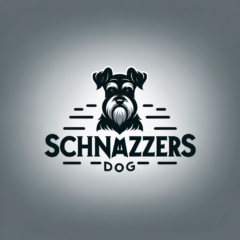The schnauzer is a versatile and beloved breed that has captured the hearts of dog lovers all over the world. With their distinctive facial features, intelligent demeanor, and adaptability, it’s no wonder that they have become a popular choice for families and individuals alike. But with three different sizes to choose from – Miniature, Standard, and Giant – finding the right Schnauzer for your lifestyle may seem overwhelming. In this article, we will delve into the characteristics and unique traits of each Schnauzer size, so you can make an informed decision about which one is best suited for you.
The Standar
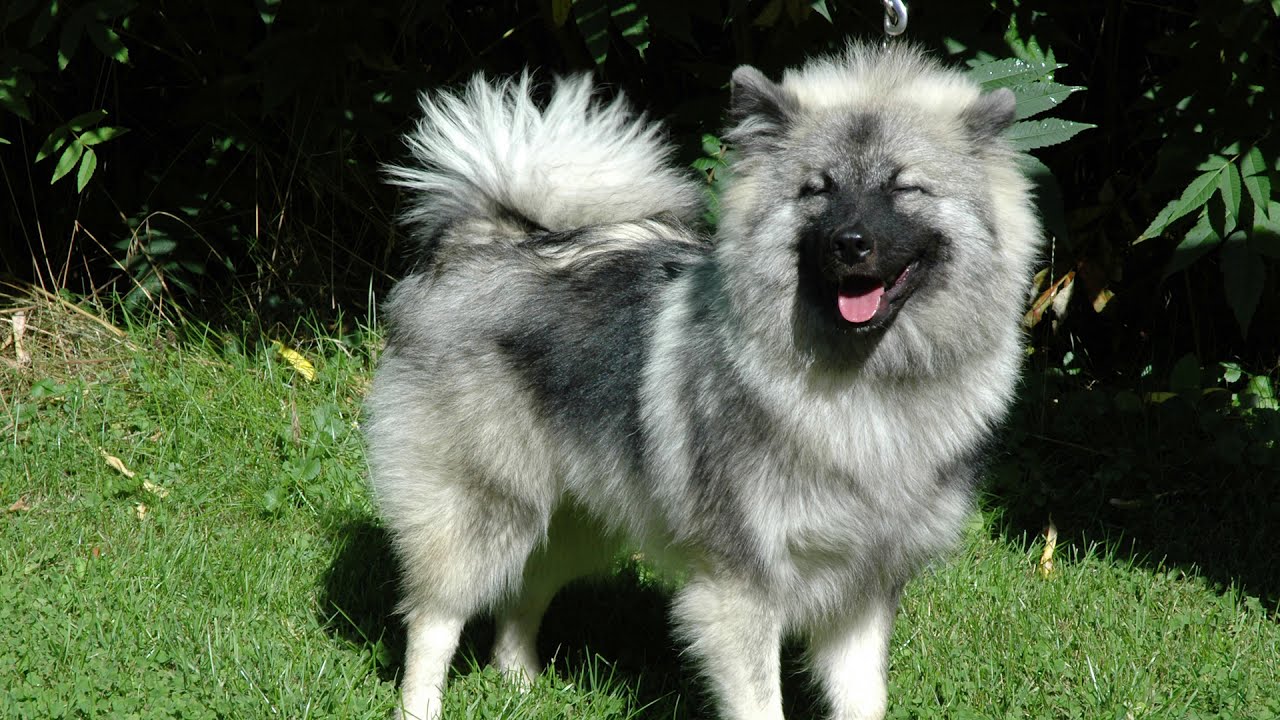
d Schnauzer: A Loyal and Intelligent Companion
The Standard Schnauzer is the original size of the Schnauzer breed, and is believed to be the foundation for the development of the Miniature and Giant Schnauzers. They were first bred in Germany in the 15th century, and were primarily used as working dogs on farms and in homes. Over time, they became popular as companions and watchdogs due to their loyalty and intelligence.
Origin and History
As mentioned before, the Standard Schnauzer originated in Germany, where they were bred as all-purpose farm dogs. Their name “Schnauze” means muzzle in German, referring to their distinct facial hair that resembles a mustache and beard. They were also known as “Wirehaired Pinschers” because of their wiry coat and their resemblance to the Pinscher breed. In the late 1800s, the Standard Schnauzer was officially recognized as a breed by the German Kennel Club.
Physical Characteristics
The Standard Schnauzer is a medium-sized dog with a square-built body and a strong, muscular frame. They typically stand at a height of 17-20 inches and weigh between 30-50 pounds. Their distinctive coat is a harsh, wiry texture that comes in various shades of grey (pepper and salt), black, and white. They also have bushy eyebrows, a mustache, and a beard, which adds to their distinguished appearance.
| Characteristic | Standard Schnauzer |
|---|---|
| Height | 17-20 inches |
| Weight | 30-50 pounds |
| Coat | Wiry and harsh |
| Colors | Grey, black, white |
| Life Span | 13-16 years |
Personality and Temperament
Standard Schnauzers are known for their intelligence, loyalty, and alertness. They form strong bonds with their owners and thrive on being a part of the family. They make excellent watchdogs and will bark to alert their owners of any strangers or suspicious activity. However, they are not an aggressive breed and can be friendly towards people and other animals, especially if they are socialized from a young age.
The Miniature Schnauzer: A Spirited and Affectionate Friend
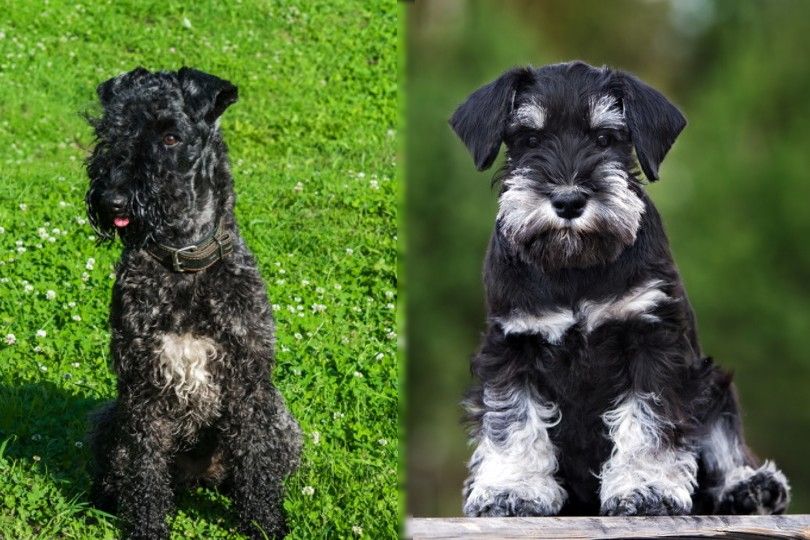
The Miniature Schnauzer is the smallest of the Schnauzer breeds, but don’t let their size fool you – they are full of energy and spunk. They were selectively bred from the Standard Schnauzer to create a smaller version of the breed, and were primarily used as rat catchers in households and stables. Today, they are popular as companion dogs and excel in various dog sports such as agility and obedience.
Origin and History
The Miniature Schnauzer was developed in Germany during the 19th century. They were bred by crossing Standard Schnauzers with Affenpinschers and Poodles, resulting in a smaller but equally intelligent breed. They were recognized as a separate breed by the American Kennel Club in 1926 and have since grown in popularity all over the world.
Physical Characteristics
The Miniature Schnauzer stands at a height of 12-14 inches and weighs between 11-16 pounds. They have a compact and square-shaped body, with a strong and muscular frame. Their coat is similar to the Standard Schnauzer, with a wiry texture that comes in various colors such as black, salt and pepper, and black and silver.
| Characteristic | Miniature Schnauzer |
|---|---|
| Height | 12-14 inches |
| Weight | 11-16 pounds |
| Coat | Wiry and harsh |
| Colors | Black, salt and pepper, black and silver |
| Life Span | 12-15 years |
Personality and Temperament
Miniature Schnauzers are known for their playful and affectionate nature. They love to spend time with their owners and enjoy being involved in all family activities. They are also energetic and require regular exercise to keep them happy and healthy. They can be prone to separation anxiety if left alone for long periods, so it’s essential to provide them with mental and physical stimulation. They are also known to be stubborn at times, but with consistent training and positive reinforcement, they can become well-behaved and obedient companions.
The Giant Schnauzer: A Powerful and Protective Guardian
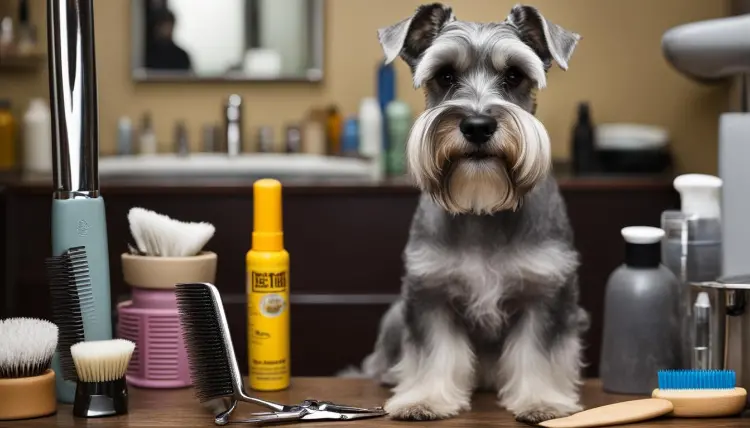
The Giant Schnauzer is the largest of the Schnauzer breeds, and their size alone is enough to make anyone think twice before crossing their path. But don’t let their intimidating appearance fool you – these dogs have a gentle side and are fiercely loyal to their families. They were originally bred in Bavaria, Germany, and were used as guard dogs and for driving cattle. Today, they are still used for protection and excel in various dog sports such as agility and tracking.
Origin and History
The Giant Schnauzer was developed in the late 1800s by crossing Standard Schnauzers with other large breeds such as Great Danes and Bouviers des Flandres. They were primarily used as guard dogs for breweries, farmhouses, and stockyards. During World War I, they were also used as messenger dogs and ambulance dogs. In 1930, the breed was officially recognized by the American Kennel Club.
Physical Characteristics
As the name suggests, the Giant Schnauzer is a large breed, standing at a height of 23-28 inches and weighing between 55-80 pounds. They have a strong and sturdy build, with a deep chest and muscular legs. Their coat is similar to the other Schnauzer breeds, with a harsh and wiry texture that comes in black or salt and pepper colors.
| Characteristic | Giant Schnauzer |
|---|---|
| Height | 23-28 inches |
| Weight | 55-80 pounds |
| Coat | Wiry and harsh |
| Colors | Black, salt and pepper |
| Life Span | 12-15 years |
Personality and Temperament
Giant Schnauzers are known for their protective and courageous nature. They are loyal and devoted to their families and will do anything to protect them. They require an experienced and authoritative owner who can provide them with consistent training and socialization from a young age. They can be wary of strangers and may exhibit aggression towards other animals if not properly socialized. However, with proper training and socialization, they can become well-mannered and loving companions.
Schnauzer Temperament and Personality Traits
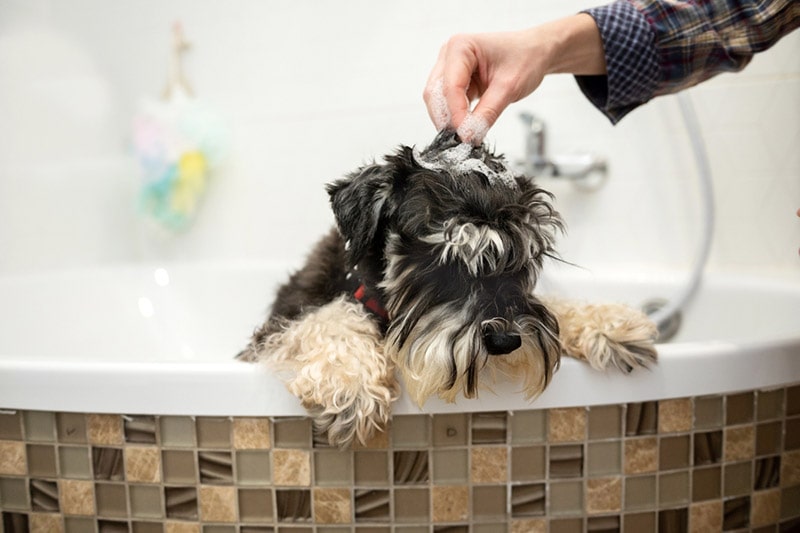
While each Schnauzer size has its distinct characteristics and traits, there are some general characteristics that apply to all three sizes. Here are some common personality traits of Schnauzers:
- Intelligent: All Schnauzers are highly intelligent and excel in various dog sports such as obedience and agility. This also means that they require mental stimulation to keep them engaged and prevent boredom.
- Loyal: Schnauzers are known for their loyalty and form strong bonds with their owners. They thrive on being a part of the family and being involved in all activities.
- Alert: Schnauzers make excellent watchdogs due to their alertness and tendency to bark at any unusual activity or strangers. This also makes them great companions for people who live alone or in isolated areas.
- Energetic: While the Giant Schnauzer may require more exercise than the Miniature Schnauzer, all three sizes have a considerable amount of energy that needs to be released through physical activity and playtime.
- Affectionate: Schnauzers are affectionate dogs who love spending time with their owners. They enjoy cuddling and being showered with attention.
- Protective: The Giant Schnauzer, in particular, is known for its protective nature, but all three sizes can exhibit protective behavior towards their families.
- Stubborn: Schnauzers can be stubborn at times, especially if they sense that their owners are not in control. Consistent training and positive reinforcement are key to managing this trait.
- Sociable: With proper socialization, Schnauzers can get along well with other animals and people. However, they may have a tendency to be dominant towards other dogs if not trained and socialized properly.
Schnauzer Grooming and Care: Keeping Your Schnauzer Happy and Healthy
While Schnauzers make wonderful companions, they do require regular grooming and care to keep them looking and feeling their best. Here are some essential grooming and care tips for Schnauzers:
Coat Maintenance
All Schnauzers have a double coat, consisting of a harsh outer coat and a soft undercoat. They require regular brushing to prevent matting and keep their coat healthy and shiny. Depending on the size and type of coat (show or pet), Schnauzers may require hand stripping or clipping every 4-6 months. It’s essential to consult with a professional groomer or breeder about the best grooming techniques for your particular Schnauzer.
Dental Care
Like all breeds, Schnauzers are susceptible to dental problems such as tartar build-up and gum disease. It’s crucial to regularly brush your Schnauzer’s teeth with a dog-specific toothpaste to prevent these issues. Providing them with dental chews and toys can also help keep their teeth clean and healthy.
Exercise and Training
Schnauzers are active dogs and require daily exercise to keep them mentally and physically stimulated. This can include walks, runs, and playtime in a fenced yard. They also excel in various dog sports such as agility, obedience, and tracking. Along with physical exercise, it’s essential to provide them with mental stimulation through training and activities such as puzzle toys.
Health Concerns
While Schnauzers are generally healthy dogs, like all breeds, they may be prone to certain health issues. These can include eye problems, bladder stones, hip dysplasia, and pancreatitis. It’s crucial to work closely with your veterinarian and breeder to ensure your Schnauzer is up to date on all vaccinations and receives regular check-ups to catch any health concerns early on.
Conclusion
In conclusion, the Schnauzer is a versatile breed that has something to offer for every lifestyle. Whether you’re looking for a loyal and intelligent companion, a spirited and affectionate friend, or a powerful and protective guardian, there’s a Schnauzer size that will fit your needs. With proper care, grooming, and training, you can expect to have a loving and devoted companion by your side for many years to come. So if you’re ready for a lifetime of love and companionship, consider adding a Schnauzer to your family today.
